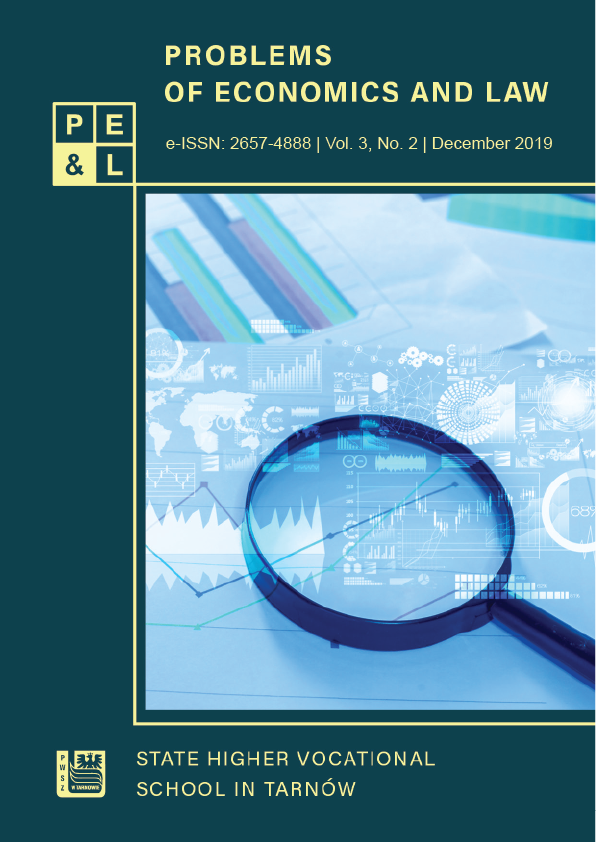Consequences of the development of the artificial intelligence
DOI:
https://doi.org/10.5604/01.3001.0013.7217Keywords:
artificial intelligence, digitization, political marketingAbstract
The development of new information and telecommunications techniques is the source of changes taking place in the modern economy. The changes taking place have several dimensions: technological, social and humanistic. Artificial Intelligence (AI) is the ability of a machine to perform cognitive functions previously associated only with human minds, such as perceiving, reasoning, learning, and solving problems independently. Learning machines will influence numerous technical solutions used in business.
Objective: The aim of the study was to diagnose and assess the social, legal and marketing consequences of the development of information technology that creates the independence of artificial intelligence.
Materials and methods: Documentation method was used in the work, publications in the field of law and economic sciences were queried.
Results: It was indicated that artificial intelligence and auto-algorithms, created as a result of self-creation by machines, analyze themselves and can initiate new market situations. Digital marketing is about identifying the needs of potential buyers, using modern IT tools, by learning about the preferences of potential buyers who leave their mark in the space of the network.
Conclusions: The lack of legal regulations allowing for precise definition of responsibility for the operation of autonomously operating devices was emphasized. The emerging new regulations should be aimed at the protection of fundamental rights as well as protection against unfettered market and marketing activity of the organization, including that related to political marketing.
Downloads
References
Chaffey D., Ellis-Chadwick F., Digital Marketing. Strategy, implementation and practice, Harlow, England New York Pearson 2019. Google Scholar
Cihon P., Technical Report Standards for AI Governance: International Standards to Enable Global Coordination in AI Research and Development Research Affiliate, Centerfor the Governance of AI Future of Humanity Institute, University of Oxford https://www.fhi.ox.ac.uk (dostęp 21.06.2019). Google Scholar
Drucker P. F., Społeczeństwo pokapitalistyczne, Wydawnictwo Naukowe PWN, Warszawa, 1999. Google Scholar
Dziennik Urzędowy Unii Europejskiej, Dyrektywa Parlamentu Europejskiego i Rady2009/72/WE z dnia 13 lipca 2009 r. dotyczący wspólnych zasad rynku wewnętrznego energii elektrycznej i uchylająca dyrektywę 2003/54/WE. Google Scholar
E-commerce w Polsce 2019. Gemius dla e-Commerce Polska https://www.gemius.pl(dostęp 12.11.2019). Google Scholar
Filipowicz A., Prawne aspekty oceny innowacyjności. Analiza i ocena, w pr. zb. red. Kałowski A., Wysocki J., Innowacje – ocena w ujęciu mikro, mezo i makro, Oficyna Wydawnicza SGH, Warszawa,2015, s. 56-64. Google Scholar
https://www.hbrp.pl (dostęp 18.06.2019). Google Scholar
Izdebski H., Działalność gospodarcza z zastosowaniem nowych technologii a „granice prawa” – na przykładzie prawa telekomunikacyjnego, w pr. zb. red. P. Girwdoyń, [w:] Prawo wobec nowoczesnych technologii. Materiały konferencyjne, Wyd. Liber, Warszawa 2008. Google Scholar
Klicki, W. Zbliża się sztuczna inteligencja energetyczna, 21.06.2012,https://panoptykon.org/wiadomosc/zbliza-sie-sztuczna-inteligencja-energetyczna (dostęp18.06.2019). Google Scholar
Komunikat Prezesa Urzędu Ochrony Danych Osobowych z dnia 17 sierpnia 2018 r. w sprawie wykazu rodzajów operacji przetwarzania danych osobowych wymagających oceny skutków przetwarzania dla ich ochrony, M.P. 2018, poz. 827. Google Scholar
Kotler Ph., Marketing. Analiza, wdrażanie i kontrola, Wyd. Gebethner & Ska, Warszawa 1994. Google Scholar
Kowalik-Bańczyk K., Sposoby regulacji handlu elektronicznego w prawie wspólnotowym i międzynarodowym, wyd. Wolters Kluwer, Kraków 2006. Google Scholar
Martineau K., Toward artificial intelligence that learns to write code, MIT News,14.06.2019 http://news.mit.edu/2019/toward-artificial-intelligence-that-learns-to-writecode- 0614 (dostęp 18.06.2019). Google Scholar
Mazurkiewicz-Pizło A., Pizło W., Marketing. Wiedza ekonomiczna i aktywność na rynku, wyd. PWN, Warszawa 2017. Google Scholar
Opinion of the European Data Protection Supervisor on the Commission Recommendation on preparation for the roll-out of smart metering systemhttps://edps.europa.eu skrócona wersja np. w języku polskim Dziennik Urzędowy Unii Europejskiej C 335/13 Streszczenie opinii Europejskiego Inspektora Ochrony Danych dotyczącej zalecenia Komisji w sprawie przygotowań do rozpowszechnienia inteligentnych systemów pomiarowych 2012/C 335/09. Google Scholar
Pizło W., Przedsiębiorstwo w społeczeństwie informacyjnym w świetle teorii ekonomii instytucjonalnej, wyd. SGGW, Warszawa 2009. Google Scholar
Podcast The Ethics of Artificial Intelligence. January 2019 https://www.mckinsey.com/featured-insights/artificial-intelligence/the-ethics-of-artificialintelligence (dostęp 18.06.2019). Google Scholar
Polak K., Apetyt na ideologie czyli co konsumuje dzisiejszy konsument, Badania marketingowe. Rocznik Polskiego Towarzystwa Badaczy Rynku i Opinii, 2018/19,edycja XXIII. Google Scholar
Power B., Jak sztuczna inteligencja usprawnia marketing i sprzedaż, Harvard Business Review Polska. Google Scholar
Przegalińska A., Istoty wirtualne. Jak fenomenologia zmieniała sztuczną inteligencję, Wyd. Universitas, Kraków, 2016. Google Scholar
Przegalińska A., Wearable Technologies in Organizations: Privacy, Efficiency andAutonomy in Work, Pallgrave Pivot, 2018. Google Scholar
Rozporządzenie Parlamentu Europejskiego i Rady (UE) 2016/679 z dnia 27 kwietnia 2016 r. w sprawie ochrony osób fizycznych w związku z przetwarzaniem danych osobowych i w sprawie swobodnego przepływu takich danych oraz uchylenia dyrektywy95/46/WE (ogólne rozporządzenie o ochronie danych), Dziennik Urzędowy Unii Europejskiej, L 119/1, 4.5.2016, https://eur-lex.europa.eu/legalcontent/PL/TXT/?uri=CELEX%3A32016R0679 (dostęp 18.06.2019) Google Scholar
Silberg J., Manyika J., Notes from the AI frontier: Tackling bias in AI (and in humans), McKinsey Global Institute, June 2019 https://www.mckinsey.com oraz Rewolucja AI. Jak sztuczna inteligencja zmieni biznes w Polsce. https://mckinsey.pl (dostęp 18.06.2019). Google Scholar
Świerczyńska-Kaczor U., e-Marketing. Przedsiębiorstwa w społeczności wirtualnej, wyd. Difin, Warszawa 2012. Google Scholar
Tadeusiewicz R., Sztuczna inteligencja jako narzędzie przewagi konkurencyjnej, w:Systemy informatyczne i metody obliczeniowe w zarządzaniu, w: AGH. Uczelniane Wydawnictwa Naukowo Dydaktyczne, Kraków 2005. Google Scholar
Ustawa z dn. 10 maja 2018 r. o ochronie danych osobowych, Dz. U. poz. 1000 ze zm. Google Scholar
Zack Rogers, Have Strategists Drunk the “AI Race” Kool-Aid? https://warontherocks.com ( dostęp 05.06.2019). Google Scholar
Zubik M., Nowe technologie jako wyzwanie i zagrożenie dla prawa, statusu jednostek i państwa, w pr. zb. red. P. Girwdoyń, Prawo wobec nowoczesnych technologii, wyd. LIBER, Warszawa, 2008. Google Scholar
Żyro F., Kiedy sztuczna inteligencja dogoni człowieka? Rozmowa z A. Przegalińską,05.01.2018, https://sektor3-0.pl/blog/kiedy-sztuczna-inteligencja-dogoni-czlowiekarozmowa-z-dr-aleksandra-przegalinska-sierkowska/ (dostęp 18.06.2019). Google Scholar
Downloads
Published
How to Cite
Issue
Section
License
Copyright (c) 2019 State Higher Vocational School in Tarnow, Poland & Authors

This work is licensed under a Creative Commons Attribution-ShareAlike 4.0 International License.





